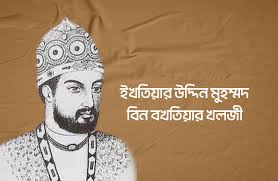A thousand years ago, the Sena kings who came from South India took away the spoken language of the Bengali people, 'Bangla'. The Hindu scholars of the Sena kings issued a fatwa, "Those who speak and listen to the Bengali language will go to a hell called 'Rourab'." At that time, Ikhtiyar Uddin Muhammad Bakhtiyar Khilji, of Turkish origin, came forward to liberate the oppressed Bengalis and in 1204, with only 18 horsemen, defeated the Sena king and liberated Bengal. The speakers said that through the conquest of Bengal by Ikhtiyar Uddin Muhammad Bakhtiyar Khilji, not only the land was conquered that day, but also the spoken language of the Bengalis, 'Bangla', was liberated.
Linguist Dinesh Chandra Sen said, “It is no exaggeration to say that the Muslim emperors are the fathers of present-day Bengali literature. Bengali literature was created by Muslims, and Bengali language is the mother tongue of Bengali Muslims.” Professor and researcher Mohammad Asaduzzaman said, “If the Muslim conquest of Bengal had not been accelerated and the rule of the East had continued in this country for a few more centuries, the Bengali language would have become extinct and would have been neglected and almost forgotten, sinking into the womb of the past.”
Through the literary practice of the Bengali language that began under the royal patronage of Muslim rulers in the Middle Ages, the Bengali language gained the ability to emerge as a full-fledged language.
Attempts to corrupt the Bengali language continued over the centuries. In the 18th century, the British established Fort William College in Calcutta and began literary practice with the aim of eliminating Arabic and Persian words from the Bengali language and introducing Sanskrit words. They wanted to show that "Muslims have no connection with the Bengali language".
To humiliate Muslims, it is propagated that the first translation of the Quran into Bengali was done by Girish Chandra Sen. However, long before Girish Chandra Sen's translation in 1886, Maulana Amiruddin Basunia had partially translated the Quran into Bengali in 1808. Then, in 1836, Maulvi Naimuddin completed the Bengali translation of the complete Quran.


